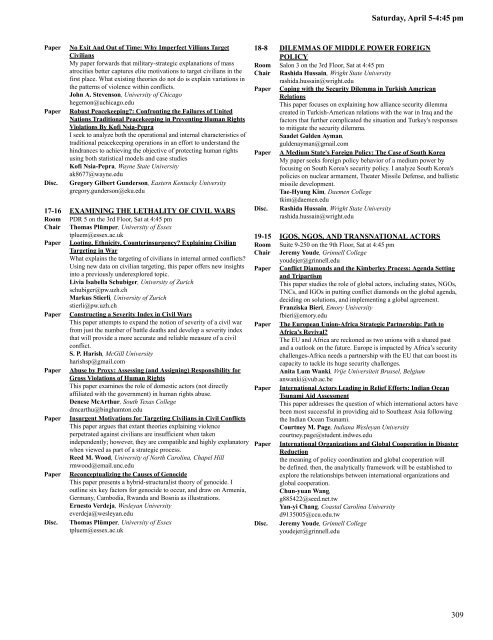2008 Conference Program - Midwest Political Science Association
2008 Conference Program - Midwest Political Science Association
2008 Conference Program - Midwest Political Science Association
Create successful ePaper yourself
Turn your PDF publications into a flip-book with our unique Google optimized e-Paper software.
Saturday, April 5-4:45 pm<br />
Paper<br />
Paper<br />
Disc.<br />
No Exit And Out of Time: Why Imperfect Villians Target<br />
Civilians<br />
My paper forwards that military-strategic explanations of mass<br />
atrocities better captures elite motivations to target civilians in the<br />
first place. What existing theories do not do is explain variations in<br />
the patterns of violence within conflicts.<br />
John A. Stevenson, University of Chicago<br />
hegemon@uchicago.edu<br />
Robust Peacekeeping: Confronting the Failures of United<br />
Nations Traditional Peacekeeping in Preventing Human Rights<br />
Violations By Kofi Nsia-Pepra<br />
I seek to analyze both the operational and internal characteristics of<br />
traditional peacekeeping operations in an effort to understand the<br />
hindrances to achieving the objective of protecting human rights<br />
using both statistical models and case studies<br />
Kofi Nsia-Pepra, Wayne State University<br />
ak8677@wayne.edu<br />
Gregory Gilbert Gunderson, Eastern Kentucky University<br />
gregory.gunderson@eku.edu<br />
17-16 EXAMINING THE LETHALITY OF CIVIL WARS<br />
Room PDR 5 on the 3rd Floor, Sat at 4:45 pm<br />
Chair Thomas Plümper, University of Essex<br />
tpluem@essex.ac.uk<br />
Paper Looting, Ethnicity, Counterinsurgency Explaining Civilian<br />
Targeting in War<br />
What explains the targeting of civilians in internal armed conflicts<br />
Using new data on civilian targeting, this paper offers new insights<br />
into a previously underexplored topic.<br />
Livia Isabella Schubiger, University of Zurich<br />
schubiger@pw.uzh.ch<br />
Markus Stierli, University of Zurich<br />
stierli@pw.uzh.ch<br />
Paper Constructing a Severity Index in Civil Wars<br />
This paper attempts to expand the notion of severity of a civil war<br />
from just the number of battle deaths and develop a severity index<br />
that will provide a more accurate and reliable measure of a civil<br />
conflict.<br />
S. P. Harish, McGill University<br />
harishsp@gmail.com<br />
Paper Abuse by Proxy: Assessing (and Assigning) Responsibility for<br />
Gross Violations of Human Rights<br />
This paper examines the role of domestic actors (not directly<br />
affiliated with the government) in human rights abuse.<br />
Denese McArthur, South Texas College<br />
dmcarthu@binghamton.edu<br />
Paper Insurgent Motivations for Targeting Civilians in Civil Conflicts<br />
This paper argues that extant theories explaining violence<br />
perpetrated against civilians are insufficient when taken<br />
independently; however, they are compatible and highly explanatory<br />
when viewed as part of a strategic process.<br />
Reed M. Wood, University of North Carolina, Chapel Hill<br />
rmwood@email.unc.edu<br />
Paper Reconceptualizing the Causes of Genocide<br />
This paper presents a hybrid-structuralist theory of genocide. I<br />
outline six key factors for genocide to occur, and draw on Armenia,<br />
Germany, Cambodia, Rwanda and Bosnia as illustrations.<br />
Ernesto Verdeja, Wesleyan University<br />
everdeja@wesleyan.edu<br />
Disc. Thomas Plümper, University of Essex<br />
tpluem@essex.ac.uk<br />
18-8 DILEMMAS OF MIDDLE POWER FOREIGN<br />
POLICY<br />
Room Salon 3 on the 3rd Floor, Sat at 4:45 pm<br />
Chair Rashida Hussain, Wright State University<br />
rashida.hussain@wright.edu<br />
Paper Coping with the Security Dilemma in Turkish American<br />
Relations<br />
This paper focuses on explaining how alliance security dilemma<br />
created in Turkish-American relations with the war in Iraq and the<br />
factors that further complicated the situation and Turkey's responses<br />
to mitigate the security dilemma.<br />
Saadet Gulden Ayman,<br />
guldenayman@gmail.com<br />
Paper A Medium State's Foreign Policy: The Case of South Korea<br />
My paper seeks foreign policy behavior of a medium power by<br />
focusing on South Korea's security policy. I analyze South Korea's<br />
policies on nuclear armament, Theater Missile Defense, and ballistic<br />
missile development.<br />
Tae-Hyung Kim, Daemen College<br />
tkim@daemen.edu<br />
Disc. Rashida Hussain, Wright State University<br />
rashida.hussain@wright.edu<br />
19-15 IGOS, NGOS, AND TRANSNATIONAL ACTORS<br />
Room Suite 9-250 on the 9th Floor, Sat at 4:45 pm<br />
Chair Jeremy Youde, Grinnell College<br />
youdejer@grinnell.edu<br />
Paper Conflict Diamonds and the Kimberley Process: Agenda Setting<br />
and Tripartism<br />
This paper studies the role of global actors, including states, NGOs,<br />
TNCs, and IGOs in putting conflict diamonds on the global agenda,<br />
deciding on solutions, and implementing a global agreement.<br />
Franziska Bieri, Emory University<br />
fbieri@emory.edu<br />
Paper<br />
Paper<br />
Paper<br />
Disc.<br />
The European Union-Africa Strategic Partnership: Path to<br />
Africa’s Revival<br />
The EU and Africa are reckoned as two unions with a shared past<br />
and a outlook on the future. Europe is impacted by Africa’s security<br />
challenges-Africa needs a partnership with the EU that can boost its<br />
capacity to tackle its huge security challenges.<br />
Anita Lum Wanki, Vrije Universiteit Brussel, Belgium<br />
anwanki@vub.ac.be<br />
International Actors Leading in Relief Efforts: Indian Ocean<br />
Tsunami Aid Assessment<br />
This paper addresses the question of which international actors have<br />
been most successful in providing aid to Southeast Asia following<br />
the Indian Ocean Tsunami.<br />
Courtney M. Page, Indiana Wesleyan University<br />
courtney.page@student.indwes.edu<br />
International Organizations and Global Cooperation in Disaster<br />
Reduction<br />
the meaning of policy coordination and global cooperation will<br />
be defined. then, the analytically framework will be established to<br />
explore the relationships between international organizations and<br />
global cooperation.<br />
Chun-yuan Wang,<br />
g885422@seed.net.tw<br />
Yan-yi Chang, Coastal Carolina University<br />
d9135005@ccu.edu.tw<br />
Jeremy Youde, Grinnell College<br />
youdejer@grinnell.edu<br />
309










